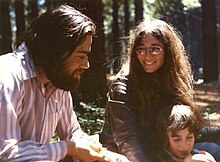Manuel Blum

Manuel Blum (born April 26, 1938 in Caracas , Venezuela ) is an American computer scientist who received the Turing Award in 1995 "in recognition of his contributions to the fundamentals of algorithmic complexity theory and its application in cryptography and program error checking" .
Life
Blum studied at MIT , earned his bachelor's degree in 1959 and his master's degree in electrical engineering in 1961, and obtained a Ph.D. in mathematics under Marvin Minsky 1964. Subsequently, he was active until 2000 as a professor of computer science at the University of California, Berkeley . In 1971 he became a Sloan Research Fellow .
Most recently, Manuel Blum was Bruce Nelson Professor of Computer Science at Carnegie Mellon University , where his wife, Lenore Blum , and son, Avrim Blum , also taught computer science professors. In 2018, the Blums resigned from all positions in protest over alleged sexism at Carnegie Mellon.
job
In the 1960s he developed an axiomatic complexity theory that was independent of specific machine models and based on Gödel numbering and Blum's axioms . This theory delivered concrete results such as the compression theorem , Borodin's gap theorem and the famous Blum's Speedup theorem .
His other works include a time-linear selection algorithm, the Blum-Blum-Shub-Generator , the Blum-Goldwasser cryptosystem and, more recently, CAPTCHAs .
His PhD students have made significant academic careers with an unusual frequency, including Leonard Adleman , Shafrira Goldwasser , Russell Impagliazzo , Silvio Micali , Gary L. Miller , Moni Naor , Steven Rudich , Michael Sipser , Ryan Williams , and Umesh and Vijay Vazirani .
Awards (selection)
- 1986: Invited Speaker at the International Congress of Mathematicians in Berkeley (How to prove a theorem so no one else can claim it)
- 1987: Fellow of the IEEE
- 1988: Fellow of the American Association for the Advancement of Science
- 1995: Turing Award and Fellow of the American Academy of Arts and Sciences
- 2002: Member of the National Academy of Sciences
Web links
Individual evidence
- ^ Lenore Blum shocked the community with her sudden resignation from CMU. Here she tells us why . September 6, 2018.
| personal data | |
|---|---|
| SURNAME | Blum, Manuel |
| BRIEF DESCRIPTION | American computer scientist |
| DATE OF BIRTH | April 26, 1938 |
| PLACE OF BIRTH | Caracas , Venezuela |